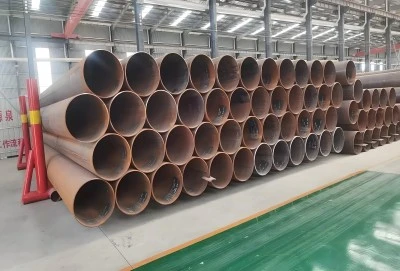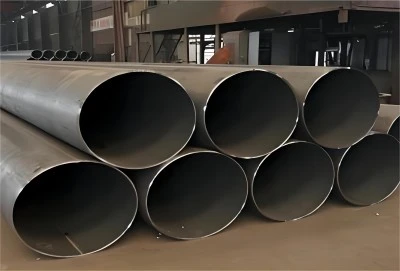The hardness of API 5L X60 steel pipe represents a crucial mechanical property that determines its durability, wear resistance, and overall performance in pipeline applications. Understanding the hardness characteristics of these pipes is essential for engineers, contractors, and end-users involved in pipeline projects. The hardness values correlate directly with the material's strength and provide valuable insights into its behavior under various operating conditions. This comprehensive analysis explores the typical hardness values, testing methodologies, and practical significance of hardness in API 5L X60 steel pipes.
|
|
|
Typical Hardness Values
API 5L X60 steel pipes exhibit specific hardness ranges that align with their mechanical properties and microstructural characteristics. The Brinell hardness values typically range from 200 to 245 HB, reflecting the balanced combination of strength and ductility required for pipeline applications. These values result from carefully controlled manufacturing processes, including proper heat treatment and controlled cooling rates, which develop the optimal microstructure.
The Rockwell hardness scale, particularly HRB measurements, provides additional verification of material properties. The typical range of 85-95 HRB corresponds well with the expected mechanical behavior of X60 grade steel. This range ensures sufficient hardness to resist deformation while maintaining the necessary ductility for field installation and service conditions. Regular hardness measurements along the pipe length help verify uniformity of properties.
Vickers hardness measurements, ranging approximately from 210 to 250 HV, offer precise evaluation of material properties. This testing method proves particularly valuable for examining variations across the pipe wall thickness and in heat-affected zones near welds. The correlation between Vickers hardness and tensile properties provides useful insights into the material's overall strength characteristics. These values must remain within specified limits to ensure optimal performance, especially in sour service applications where excessive hardness could increase susceptibility to hydrogen-induced cracking.
Testing Methods
The Brinell hardness test represents a fundamental method for evaluating API 5L X60 pipe materials. This test involves applying a specific load through a hardened steel ball onto the pipe surface, creating an indentation whose diameter correlates with material hardness. The test parameters, including ball diameter and applied load, are standardized to ensure reproducible results. Multiple measurements at various locations provide comprehensive data about property uniformity.
Rockwell hardness testing offers advantages in terms of speed and simplicity. The method employs either a diamond cone or steel ball indenter, depending on the anticipated hardness range. The testing procedure includes both major and minor loads, with the difference in penetration depth determining the hardness value. This method proves particularly useful for quality control during production and for field verification of material properties.
The Vickers hardness test utilizes a pyramid-shaped diamond indenter to create precise impressions in the material surface. This method allows for testing of both macro and micro hardness, depending on the applied load. The resulting indentation measurements provide detailed information about local material properties, especially important near welds and in through-thickness examinations. Advanced imaging systems enable accurate measurement of indentation dimensions and automated data recording.
Quality control procedures typically require regular hardness testing throughout the manufacturing process. Testing locations include the pipe body, weld seams, and heat-affected zones. Specialized procedures address testing of both the interior and exterior surfaces, with particular attention to areas subject to forming stresses. Documentation of test results maintains traceability and verifies compliance with specification requirements.
Practical Importance of Hardness
The hardness properties of API 5L X60 steel pipes directly influence their performance in service. Adequate hardness ensures resistance to mechanical damage during transportation, installation, and operation. The relationship between hardness and wear resistance becomes particularly important in applications involving abrasive materials or frequent mechanical contact. Pipeline operators rely on appropriate hardness levels to maintain long-term integrity of their systems.
Environmental factors significantly impact the importance of controlled hardness properties. In sour service applications, excessive hardness can increase susceptibility to sulfide stress cracking. Conversely, insufficient hardness may lead to premature wear or deformation under operating conditions. The balance between these requirements necessitates careful control of manufacturing processes and thorough verification of material properties.
Field repairs and modifications often require welding operations, where material hardness plays a crucial role. Proper welding procedures must consider the base material hardness to prevent formation of brittle zones or regions of excessive softening. Post-weld hardness testing verifies that welding operations have not adversely affected material properties. This aspect becomes particularly important in pipeline repair and modification projects.
China API 5L x60 Steel Pipe Exporter
LONGMA GROUP maintains comprehensive quality control systems for hardness testing throughout their manufacturing processes. Their production facilities employ modern testing equipment and qualified personnel to ensure consistent compliance with API 5L requirements. Regular calibration of testing equipment and verification of measurement procedures maintain the accuracy of hardness testing programs.
The company's quality assurance system includes detailed documentation of hardness test results for all manufactured pipes, ensuring compliance with stringent industry standards. Test reports provide comprehensive information about testing locations, methods used, specific testing parameters, and correlation with other mechanical properties, such as tensile strength and yield strength. This thorough documentation offers customers confidence in product quality, ensuring the pipes meet application-specific requirements. Additionally, it facilitates full material traceability throughout the project lifecycle, enabling seamless tracking from manufacturing to installation. This level of transparency and reliability underscores LONGMA GROUP’s commitment to delivering products of the highest standard.
LONGMA GROUP's technical capabilities extend to the manufacture of both PSL1 and PSL2 API 5L X60 steel pipe, with careful attention to hardness control in critical applications. Their manufacturing processes incorporate modern equipment and control procedures to achieve consistent material properties. Interested parties can contact LONGMA GROUP at info@longma-group.com for detailed information about their API 5L X60 pipe products and associated quality control programs.














